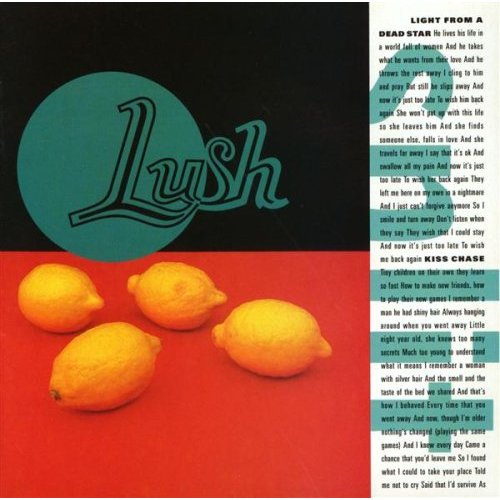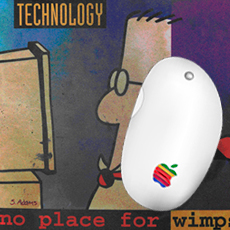
Here’s a strong contender for the quintessential album of the 1990s — bold, patchy color fields, seemingly arbitrary objects, almost no depth perspective, and a nice big dose of cutoff narrow sans-serif. Also worth noting is the theme of the record, which is apparently lemons — a fruit of the brightest and sourest variety. Keep in mind there’s no lemonade in sight.
Like many 90s albums, this one is rife with angst and lovelorn epithets. If the visuals seem too vague (or even pointless) there’s always the text on the cover’s right side, which is actually the albums lyrics overflowing from the liner notes onto the front. That first song is indeed titled “Light from a Dead Star”, and it starts off like this:
He lives his life in a world full of women
And he takes what he wants from their love
And he throws the rest away
Speaks for itself doesn’t it? But as soon as you might think the whole album is an ode to trashing boyfriends, the second song’s lyrics come into view — a song called “Kiss Chase” that ends the column with the words:
Told me not to cry
Said that I’d survive
So the album begins, with the sound and visuals bleeding into one another right on the front cover, watermarked with the album’s title — branding the work as one of bittersweet love.
The calamitous nature of Lush’s lovelife manages to take form in their song aptly titled “Lovelife”. From the start, the track boasts the cheery twinkling guitar sound of classic dream pop on uppers, keeping in line with its mid-90s vibe (chorus, tremolo, and flanger over pseudo house drum beats). It all soars overhead from the start, the fresh crackle of tambourine shakes sweetly lifting the composition towards the heavens. But those lyrics — my god. It starts mildly with a bizarre aphorism:
You are the one
In your concrete arms I adore you
Dirty and dear
No sweat so far — just an off-color characterization. And then, the sound/vision irony starts reaching Cardigans-like levels with lines like:
Every door conceals a dream and a nightmare
Nothing is ever really pure in the stale air
And:
Poison my lungs, my blood is full of lead
Things unsaid
My love for your still burns
Somebody’s bitter.
This dark undercurrent appears throughout the album in more overt places, namely in the seven-and-a-half minute dirge of “Desire Lines“, which sounds just like a desperate, depressive state of self-aware catatonia — a festering prison of meat, stuck inside on a rainy day. “Undertow” takes a more subtle approach to the same murky depths. The track once again harnesses the propulsive drumming of “Lovelife”, but with a different set of accompaniments. Falling in line with the concurrent shoegaze movement, the track churns with swirling guitar distortion, mimicking the overpowering currents of the ocean. The irony is absent here — instead, we get a direct line of sight to the natural event referenced in title, sweeping the listener in a dreadful froth. The effect is quite beautiful for its inundating qualities — confronted by a blast of noise and the restless energy of a determined beat, a haunting echo calls out: “Let me try to pull you free.”
Could anybody get away with this kind of album in our time? Probably, but not likely. Not after Radiohead perfected the blasé doldrums on 2000’s Kid A, and especially not after the anti-emo backlash of the mid-2000s. Catharsis these days is either channeled through the sexualized horrorshows of pop and rap bombast, or barely audible through the acoustic whispers of bearded gentlemen. Lush’s sweet spot between the two seems to belong keenly to the 90s — that era of Gen X and the Smashing Pumpkins and the Cranberries and four lemons on a field of red and black.
For more album art reviews, visit Probably Just Hungry.







